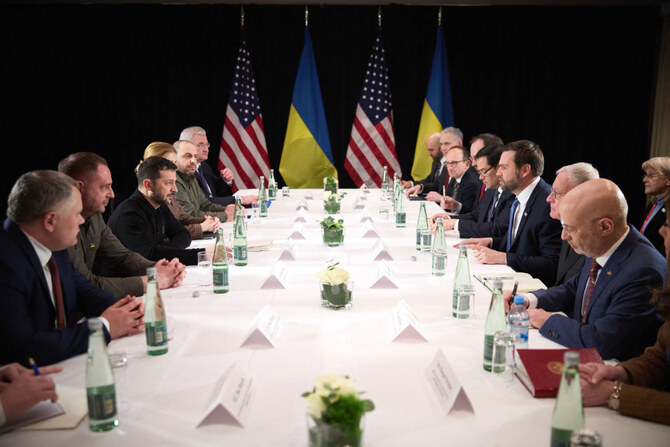MUNICH, Germany: US Vice President JD Vance pledged Friday that Washington sought to secure a “lasting” peace as he held a first meeting with Ukraine’s leader Volodymyr Zelensky to discuss Donald Trump’s push for a deal with Moscow.
The talks in Munich were seen as a key moment for Kyiv as it tries to keep Washington on its side after Trump stunned allies by announcing peace efforts with Russian leader Vladimir Putin.
“We want to achieve a durable, lasting peace, not the kind of peace that’s going to have Eastern Europe in conflict just a couple years down the road,” Vance said as the meeting wrapped up.
In an with NBC on Friday, Zelensky admitted that Ukraine has a “low chance” of surviving Russia’s invasion without military support from the United States.
“You know the difficult situations, you have a chance. But we will have low, low chance to survive without support of the United States,” Zelensky said in a clip from the interview, which will be aired on full Sunday.
During the meeting in Munich, Vance said “good conversations” had been had with Zelensky about how they could reach that goal, and they would have more talks “in the days, weeks and months to come.”
Zelensky also hailed a “good conversation,” saying the encounter with Vance was “our first meeting, not last, I’m sure.”
“We are ready to move as quickly as possible toward a real and guaranteed peace,” Zelensky wrote later on X, adding that an envoy from Washington would visit Kyiv.
Trump rattled Ukraine and its European allies on Wednesday by agreeing to launch peace talks in his first publicly announced call with Putin since returning to office.
The dramatic thaw in relations sparked fears Ukraine could be left out in the cold after nearly three years battling against Moscow’s invasion.
US officials have insisted that Zelensky will be involved in negotiations — and the Ukrainian leader said he would be prepared to sit down with Putin after agreeing a “common plan” with Trump.
“Only in this case I’m ready to meet,” Zelensky told the Munich Security Conference before seeing Vance.
Vance said ahead of the meeting that the United States was prepared to pressure Russia, adding that Europe should “of course” be at the table.
But he also told Europe to “step up” on bolstering its own defense to allow Washington to focus on threats elsewhere in the world.
US officials have sent mixed messages over Washington’s strategy after Pentagon chief Pete Hegseth appeared to rule out Ukraine joining NATO or retaking all of its territory.
That has sparked major worries in Kyiv and Europe that Ukraine could be forced into a bad deal that leaves the continent facing an emboldened Putin.
But Vance told The Wall Street Journal that Trump would put everything “on the table” in potential talks, and that Washington could even use “military leverage” against Russia to force a deal.
He did not give more away in a keenly awaited keynote speech, as he avoided addressing the war in Ukraine and focused instead on scolding Europe over immigration and free speech.
Saudi Arabia, after being named by Trump as a likely venue for a meeting with Putin, said it would welcome holding any talks between the two leaders.
Zelensky appeared to play down fears that Trump was cutting out Kyiv, saying the US president had given him his personal number when they spoke.
French President Emmanuel Macron said he assured Zelensky that it’s “Ukrainians alone who can drive the discussions for a solid and lasting peace” with Russia, in a post on X.
In a bid to keep Washington close, Kyiv has held talks over granting access to its rare mineral deposits in return for future US security support.
European allies, who along with Washington are Ukraine’s strongest backers, demanded that they too be included in negotiations that will impact their continent’s security.
EU chief Ursula von der Leyen warned that forcing Ukraine into a bad deal would harm US interests.
“I believe that by working together, we can deliver that just and lasting peace,” she said.
While Europe nervously monitors the US stance on Ukraine, there is little ambiguity on Trump’s determination to get Europe to spend more on its defense.
Fears that Vance could announce a major US troop reduction in Europe did not materialize, but he repeated warnings that Washington needed to focus more on other parts of the globe.
On the sidelines of the conference, Vance also met with leader of the far-right Alternative for Germany (AfD), Alice Weidel, according to German press.
It comes as Vance criticized Germany for blocking the far right from possibly sharing power in upcoming elections.
The conservative candidate and poll favorite Friedrich Merz insists he would not govern with the AfD or actively seek its support.
Amid the diplomatic flurry in Munich, Zelensky said that back on the ground in Ukraine a Russian drone had struck a cover built to contain radiation at the Chernobyl nuclear power plant, though he added that radiation levels were normal.
The Ukrainian air force said Russia had launched 133 drones across the country overnight, including attack drones, targeting northern regions of the country where the Chernobyl plant lies.
Zelensky said the attack was evidence that “Putin is definitely not preparing for negotiations — he is preparing to continue deceiving the world.”














